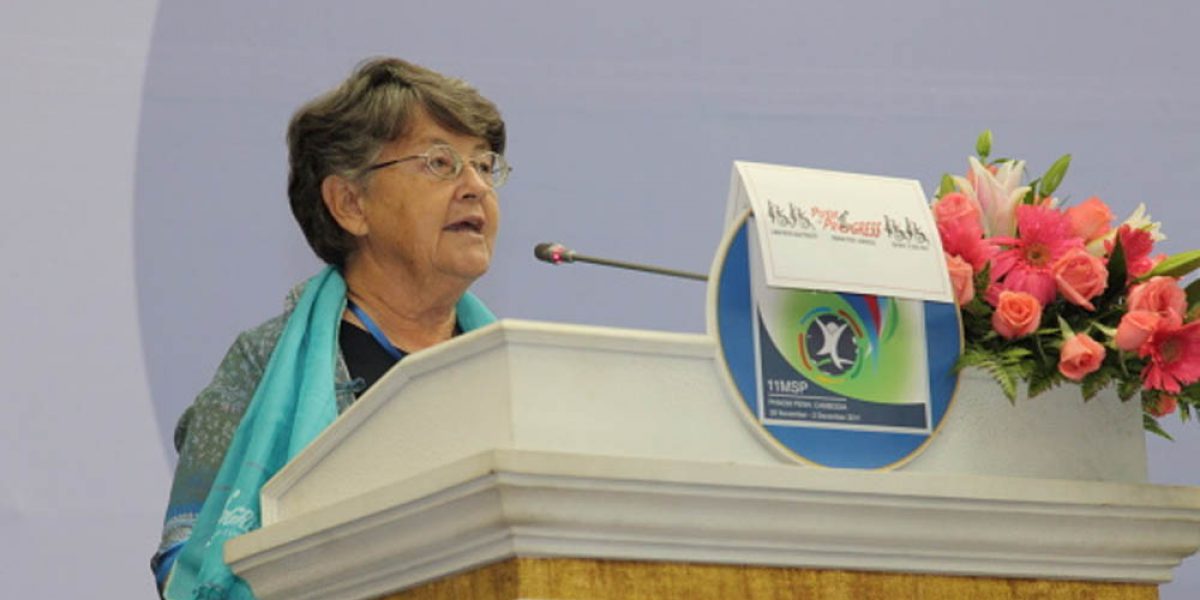Cambodia: what we decide here affects the lives of people
28 November 2011|Denise Coghlan

Phnom Penh, 28 November – In front of delegates from more than 100 countries Sr Denise Coghlan, RSM, director of JRS Cambodia, delivered opening remarks to the Eleventh Meeting of States Parties to the Mine Ban Treaty. In her remarks, she observed the work she and her team have done to ban landmines around the world over the past 20 years and reminded nations of their international obligation to protect their people.
Excellencies, friends of the Mine Ban Treaty and especially Tuvalu and South Sudan, our two newest community members,
What a wonderful day! Here we are, gathered in hope that together we can push forward on the road to a world of peace; a world where justice and dignity is enjoyed by each human person, especially the poorest, the most vulnerable, the most scarred.
It is my privilege to represent ICBL and our founding co-ordinator and Nobel Peace Prize co-laureate, Jody Williams.
Years ago when we published the first Landmine Monitor our Cambodia edition had as a preface: “The credibility of this treaty depends on the difference it makes to the lives of people living in mine affected communities.”
Jody challenged: “This treaty is a huge step forward in disarmament and international law.”
Of course, we were both right! Our treaty is both a disarmament treaty and a humanitarian treaty.
Over the course of the week our ICBL campaigners will speak of many issues and convey both our congratulations for progress made, and our serious concerns about delays in implementation.
But for the moment I would like to focus on the more fundamental issue: why are we here in Cambodia?
The people at the heart of the mine ban movement, who are also its conscience, remind us very visibly of why we must continue to implement this Treaty. As Jean Vanier put it, “The physical handicaps of some remind us of the handicaps in all of our hearts.”
I would add that the courage, determination and resilience of some urge all of us, and even shame us, to take further effective action.
This is not just another meeting. What we decide here affects the lives of people. Getting more mines out of the ground rapidly, ensuring released land is safe for farming, development and even dancing is something that can be done now.
An end to the suffering
Cambodia tugs at the heart of most people. This small country of 14 million has suffered so much. Victim of a proxy war and fractured by civil conflict which left behind millions of unexploded mines, cluster munitions and other remnants of war in it soil, butchered by a genocidal regime, denied international aid for years; Cambodia is a microcosm and poignant reminder of what has happened in many parts of the world and continues to take place today.
In the 80s stories of the atrocities of the Khmer Rouge era began seeping through the international media. In the 90s it was the stories of “mine victims,” and the advocacy of so called “amputee ambassadors” that caused Cambodia to be named the cradle of the mine ban movement.
So this pilgrimage back to the roots of the movement calls you to further action.
The strong partnership between monarchs, governments, survivors, civil society, journalists, photographers, the ICRC, the UN and the ICBL on the mine ban issue has always been strong in Cambodia.
This week let it continue! Push for a very practical sharing of progress and problems, so that 2012 will be a wonderfully productive year for ridding the world of mines and addressing their consequences.
Push for progress!
Denise Coghlan, OSM, country director of JRS Cambodia


